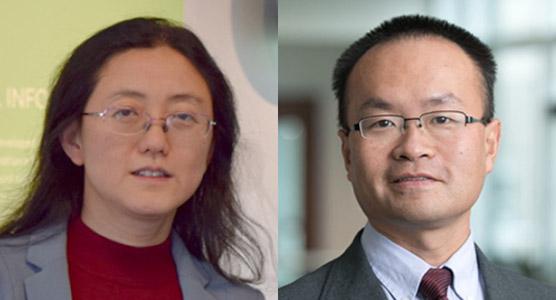
Credit: Indiana University School of Medicine
INDIANAPOLIS — Putting together research for publication can be a challenging and time-consuming process, heightened even further because of the current COVID-19 situation, during which non-essential labs have been hibernated and many researchers are now working separately and remotely, instead of collaborating within the same space.
Despite those obstacles, Indiana University School of Medicine faculty and Regenstrief Institute research scientists had their research published in Nature Communications on April 14, which is an even more significant feat considering one of the leading authors has been quarantined in Wuhan, China for the last two months of their work.
The team consists of Affiliated Scientist Jie Zhang, PhD, Regenstrief Institute Research Scientist Kun Huang, PhD, both Indiana University School of Medicine faculty members, Jun Cheng, PhD, of Shenzhen University and colleagues including Liang Cheng, M.D. of IU School of Medicine.
The study was led by Dr. Zhang, an assistant professor of medical and molecular genetics at IU School of Medicine. The work focuses on the application of machine learning and image analysis to help researchers distinguish a rare subtype of kidney cancer (translocational renal cell carcinoma, or tRCC) from other subtypes by examining the features of cells and tissues on a microscopic level. Dr. Zhang said the structural similarities have caused a high rate of misdiagnosis. Within this publication, the researchers studied 74 tRCC samples, which constitutes the largest tRCC collection in the world.
“The phenotype of this tRCC looks very much like clear cell renal cell carcinoma, or ccRCC, the most common type of renal cell carcinoma, so it’s kind of difficult for pathologists to distinguish between the two,” said Dr. Zhang. “To improve that, we tried to use the machine-learning technique, feeding in the digitized pathological image data to the analysis pipeline to train the computer to extract the features related to tRCC. This will help pathologists confirm the case, instead of just relying on their eyes.”
The first author of this paper, Dr. Jun Cheng started working with Drs. Zhang and Huang in 2016, while Dr. Jun Cheng was a visiting PhD student from China. He visited for the first time when Drs. Zhang and Huang were researchers at Ohio State University, before they joined IU School of Medicine and Regenstrief Institute, and has also visited them since they transitioned to their current roles. Dr. Jun Cheng is currently an assistant professor at Shenzhen University and had traveled to his hometown of Wuhan for winter vacation.
“I was planning to stay at home for 10 days,” said Dr. Jun Cheng. “Three days later, the whole city of Wuhan was in lockdown (due to concerns of COVID-19) and the lockdown lasted for over two months.”
The city of Wuhan became the epicenter of the pandemic, with more than 50,000 confirmed cases of COVID-19 among the population of 11 million people. As he was working to revise their publication, Dr. Cheng could not return to his lab at Shenzhen University, since teachers and students who left for vacation weren’t allowed to go back due to the pandemic. He only had a laptop at his home, but needed a high-performance computer to conduct data analyses.
“Fortunately, one student in my lab didn’t go home and stayed in school during winter vacation,” said Dr. Jun Cheng. “She helped boot the computer in my lab and then I did all the experiments on it remotely.”
Dr. Jun Cheng also needed to repeat some of the analysis for the revised manuscript, which required a transfer of previously downloaded public data to China from Dr. Huang’s lab in Indiana, and it took a week to complete the data transfer.
“It was quite stressful to revise the publication during the quarantine, but finally we made it,” said Dr. Jun Cheng.
Dr. Huang described this publication as a true team science effort, involving both internal and international collaborations, both of which he said are essential. Liang Cheng, MD, Virgil Moon Professor of Pathology from IU School of Medicine and one of the corresponding authors in the paper, was able to collect additional tRCC and ccRCC samples within two weeks from a collaborator in Michigan for the additional analysis, which he described as an amazing accomplishment.
“In many cases, we collaborate internationally because there is a huge innovation base that can help with our research,” said Dr. Huang, who is also the Director of Data Sciences and Informatics for the IU Precision Health Initiative. “Even in difficult times, as long as we have enough resources and means of communication, we can still carry out collaborative research.”
This research focuses on renal cancer based on genetic markers rather than location of the disease. This study was supported in part by the IU Precision Health Initiative.
The city of Wuhan was reopened earlier this month.
###
Media Contact
John Erickson
[email protected]
Related Journal Article
http://dx.




